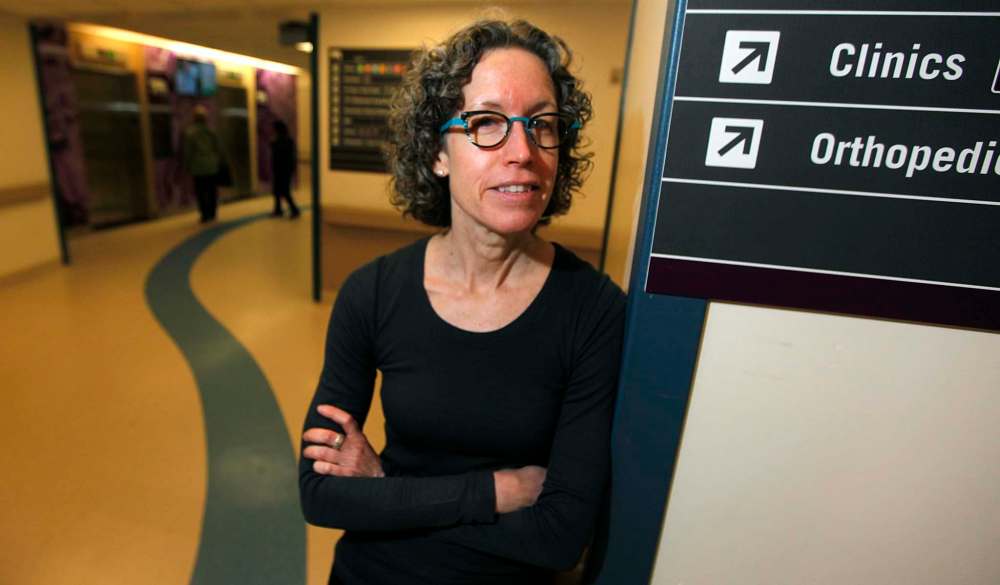Requests for assisted death increase, health-care team grows to meet need
Advertisement
Read this article for free:
or
Already have an account? Log in here »
To continue reading, please subscribe:
Monthly Digital Subscription
$19 $0 for the first 4 weeks*
- Enjoy unlimited reading on winnipegfreepress.com
- Read the E-Edition, our digital replica newspaper
- Access News Break, our award-winning app
- Play interactive puzzles
*No charge for 4 weeks then billed as $19 every four weeks (new subscribers and qualified returning subscribers only). Cancel anytime.
Read unlimited articles for free today:
or
Already have an account? Log in here »
Hey there, time traveller!
This article was published 18/10/2017 (2380 days ago), so information in it may no longer be current.
Despite a brief slowdown during the summer, the number of people seeking an assisted death in Manitoba appears to be increasing.
Between the start of 2016 and Oct. 10, 68 people have died in the province with medical assistance, 44 in 2017 alone. The number of inquiries to the provincial team has already more than doubled this year.
And yet, Dr. Kim Wiebe, who heads up the MAID (medical assistance in dying) team, said the increase hasn’t been accompanied by any of the negativity the group of health-care specialists anticipated when they began navigating the turbulent subject.

“We continue to have pretty amazing support,” she said. “It’s surprising; we really still haven’t had any negative reactions from anybody — co-workers or the public — so I think that helps tremendously.”
Manitoba is one of a few provinces that has a dedicated team offering guidance and support to people who’ve made the choice to end their lives. Although currently under the umbrella of the Winnipeg Regional Health Authority, Wiebe said the plan is for the group to be brought under Shared Health Services Manitoba after it becomes fully operational next spring.
MAID is a small team that grew quickly to meet demand and is currently comprised of nine doctors, three nurses (one of whom doubles as an educational co-ordinator), four social workers, two pharmacists, an speech-language pathologist and an administrative assistant. They all work varying, part-time hours.
While only five people received an assisted death in Manitoba in the first half of 2016, that number grew to 19 in the latter half of the year, and 30 in the first half of 2017.
Since July, 14 people have died with medical help, although Wiebe said most of those patients ended their lives after the summer.
“The people that we were meeting were sharing with us that they loved summer,” she said. “They were hopeful that they were going to get as much time over the summer as they could eke out before having an assisted death.”
Whether that’s a trend that will hold long-term or prove true across the country, Wiebe couldn’t say. Maybe, she said, its “a Manitoba phenomenon, because summer is so precious.”
Not everyone who reaches out to the team is approved for an assisted death.
Under the current federal requirements, a person needs to be at least 18 years old, have an illness, disease or disability that is serious and incurable. Their suffering — physical or psychological — must be intolerable, they must be in an advanced state of irreversible decline and their death must be reasonably foreseeable.
The majority of Manitobans looking for help have some form of chronically progressive illness, such as cancer, Wiebe said. When the team began its work, there were calls from people suffering from mental illnesses. Requests of that nature have declined over time as awareness of the necessary criteria has grown.
“We try not to close the door permanently,” she said. In addition to explaining there are expert panels examining the current restrictions at the request of the federal government, she encourages people to reach out if their situation changes.
So far, the team has declined 71 people.
That isn’t the number Shanaaz Gokool, chief executive officer of Dying with Dignity Canada, finds most troubling.
“My real concern would be the number of people who’ve died before their request has been fulfilled,” Gokool said. “There just isn’t enough data to say why.”
By the WRHA’s count, 54 people who reached out to MAID died without assistance this year between January and June. Of that number, 23 were in the process of being assessed.
Someone seeking help to die must make an inquiry, then have a medical-chart review, two independent assessments and wait through a 10-day reflection period before their request can be approved.
Gokool said her organization wants to know how many are dying unassisted because they’ve lost the mental capacity to make a final decision or because the process itself is taking too long. If the latter, it could be an indication there aren’t enough health-care providers engaged in the process.
“The thing that is really clear is Manitoba, like every other province, is having problems around the collection and reporting of the data,” she said. “Without that information it becomes very difficult to make decisions about, ‘Is this thing working? Is it working well? Are there enough providers in Manitoba?’”
A spokeswoman for the WRHA said MAID has no concerns about its ability to deal with requests in a timely manner, noting the team’s growth over the last year.
“It is important to note, however, that the process generally takes a minimum of two weeks from initial contact with the team to earliest date a client could choose to have an assisted death,” she said. “On occasion, clients and families are not aware of this legal time frame… and contact is made too late.”
jane.gerster@freepress.mb.ca
History
Updated on Thursday, October 19, 2017 4:59 PM CDT: Edited


